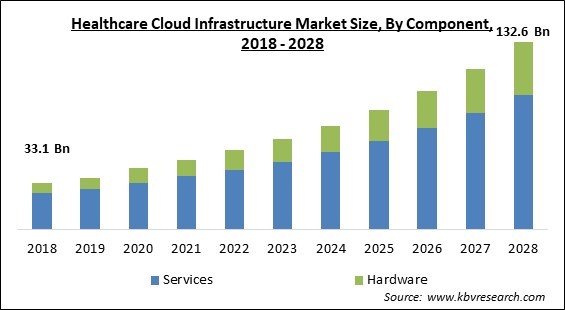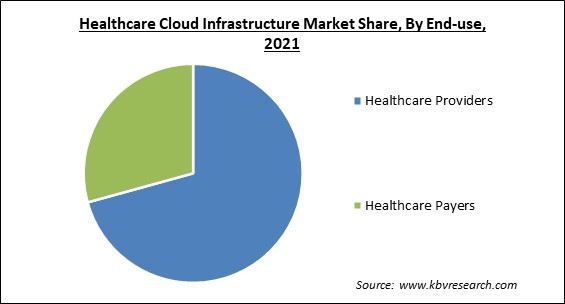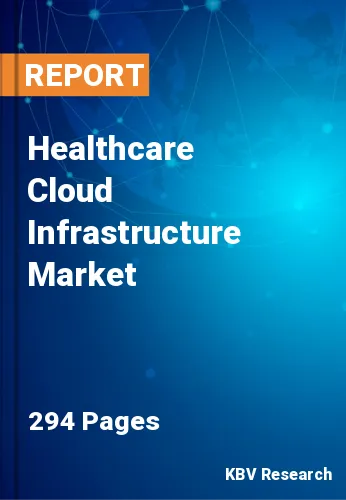The Global Healthcare Cloud Infrastructure Market size is expected to reach $132.6 billion by 2028, rising at a market growth of 15.4% CAGR during the forecast period.
In order to collect, manage, store, and back up personal and health care data, health care service providers typically utilize cloud infrastructure, which is a type of cloud computing. The number of patients visiting hospitals is rising, especially in public hospitals, which provide a wide range of medical services. Due of this, departments now have enormous amounts of data, making it nearly impossible to preserve and safeguard using old methods.

In contrast, a prominent market development component is cloud computing. Because it allows for flexibility in data storage and management, cloud computing is becoming more and more popular in the healthcare sector. Healthcare providers are rapidly appealing to the cloud for HIPAA-compliant software, storage, and networking alternatives since it has swiftly emerged as a low-cost method of building the intricate infrastructure necessary to support a range of crucial organizational functions.
Healthcare firms may build a flexible, future-proof infrastructure due to the various advantages that HIPAA-compliant cloud tools can provide, such as remote file sharing, cost savings, custom apps, and enhanced storage. In the upcoming years, healthcare cloud infrastructure is anticipated to overtake on-premise IT infrastructure as the foundation for big data analytics and the continuous advancement of electronic health records in healthcare.
A complete health IT infrastructure can make usage of the cloud in some way, from customer patient portals or mobile applications to back-end development and data sharing. It's crucial for IT decision-makers to comprehend and have faith in the cloud solutions they adopt across their IT infrastructure as this technology increasingly influences consumer and corporate technologies alike.
Due to its scalability, cloud computing helps in these situations with hassle-free data backup and storage. One can also scale back throughout busy days owing to the cloud. Additionally, due to the widespread use of video conferencing and phone calls for consultations by healthcare practitioners throughout this pandemic, the growth of this market is anticipated to substantially boost over the forecast period. Patients with minor symptoms are required by the social isolation policies to choose remote consultation. The pandemic has resulted in severe resource shortages. Value-based pricing and other pricing models would consequently emerge.
The delivery of health care to remote regions is proven to be made possible by the convergence of wireless technologies and the cloud. Most doctors and experts operate in metropolises and cities in a number of countries. As a result, only in these locations are sophisticated care facilities available, leaving patients in remote areas unattended. By using a telecloud, which enables doctors and healthcare professionals to evaluate and cure patients over long distances in real-time and at reasonable costs, this issue can be solved.
The use of IoT in healthcare has revolutionized the entire healthcare sector. The adoption of IoT devices for patient monitoring in the healthcare industry has the potential to keep patients safe and healthy while enabling clinicians to provide better treatment. Over the forecast period, it is expected that the healthcare industry would increasingly use IoT technology and solutions, accelerating market growth. In order to improve throughput and expand their service offerings, businesses like IBM, SAP SE, and Cisco Systems Inc. are concentrating on incorporating IoT technology and solutions with healthcare.
The fact that vendor-hosted data is less secure than data kept on-premises is a fundamental worry in regard to cloud solutions. Patient information is regarded as sensitive, and a high level of privacy must be upheld to ensure that only authorized individuals can access this information. Patient data has been scrutinized by legal frameworks in several nations, including the US's HIPAA (Health Insurance Portability and Accountability Act). The EU also has a number of directives pertaining to data protection. Patients' Protected Health Information (PHI) cannot often be transferred outside of the nation in which it was first created.
Based on component, the healthcare cloud infrastructure market is segmented into Hardware (Server, Storage, and Network) and Services {Software-as-a-service (SaaS), Infrastructure-as-a-service (IaaS), and Platform-as-a-Service (PaaS)}. The Platform-as-a-Service (PaaS) segment recorded a substantial revenue share in the healthcare cloud infrastructure market in 2021. It provides better flexibility and control over apps created by providers, as well as minimizing the costs and ownership issues that are typically connected to infrastructure-as-a-service (IaaS).

On the basis of end-use, the healthcare cloud infrastructure market is classified into Healthcare Providers (Hospitals, Diagnostic & Imaging Centers, and Ambulatory Centers) and Healthcare Payers. The healthcare payers segment procured a significant revenue share in the healthcare cloud infrastructure market in 2021. Insurance companies, health plan sponsors, and third-party payers are all examples of healthcare payers. Payers are quickly implementing cloud infrastructure solutions for fraud protection, risk assessment, insurance claim settlement, and highly secure collecting and storage.
| Report Attribute | Details |
|---|---|
| Market size value in 2021 | USD 49.3 Billion |
| Market size forecast in 2028 | USD 132.6 Billion |
| Base Year | 2021 |
| Historical Period | 2018 to 2020 |
| Forecast Period | 2022 to 2028 |
| Revenue Growth Rate | CAGR of 15.4% from 2022 to 2028 |
| Number of Pages | 294 |
| Number of Tables | 507 |
| Report coverage | Market Trends, Revenue Estimation and Forecast, Segmentation Analysis, Regional and Country Breakdown, Companies Strategic Developments, Company Profiling |
| Segments covered | Component, End-use, Region |
| Country scope | US, Canada, Mexico, Germany, UK, France, Russia, Spain, Italy, China, Japan, India, South Korea, Singapore, Malaysia, Brazil, Argentina, UAE, Saudi Arabia, South Africa, Nigeria |
| Growth Drivers |
|
| Restraints |
|
Region-wise, the healthcare cloud infrastructure market is analyzed across North America, Europe, Asia Pacific and LAMEA. North America emerged as the leading region in the healthcare cloud infrastructure market with the highest revenue share in 2021. This is explained by the fast-rising cost of healthcare and the expansion of IT infrastructure. The industry is made up of some of the key market players who are creating healthcare cloud infrastructure services and solutions and offering facilities for implementation and training, which is anticipated to significantly contribute to the expansion of the regional market.
Free Valuable Insights: Global Healthcare Cloud Infrastructure Market size to reach USD 132.6 Billion by 2028
The market research report covers the analysis of key stake holders of the market. Key companies profiled in the report include Dell Technologies, Inc., Microsoft Corporation, Hewlett-Packard Enterprise Company, Oracle Corporation, IBM Corporation, Salesforce.com, Inc., and Amazon.com, Inc.
By Component
By End User
By Geography
The global Healthcare Cloud Infrastructure Market size is expected to reach $132.6 billion by 2028.The global Healthcare Cloud Infrastructure Market size is expected to reach $132.6 billion by 2028.
Rising Prevalence Of Telehealth Consultations And Telecloud are driving the market in coming years, however, Increasing Concerns Among Organizations About Privacy And Data Security restraints the growth of the market.
Dell Technologies, Inc., Microsoft Corporation, Hewlett-Packard Enterprise Company, Oracle Corporation, IBM Corporation, Salesforce.com, Inc., and Amazon.com, Inc.
The expected CAGR of the Healthcare Cloud Infrastructure Market is 15.4% from 2022 to 2028.
The Healthcare Providers segment acquired maximum revenue share in the Global Healthcare Cloud Infrastructure Market by End-use in 2021 thereby, achieving a market value of $92.2 billion by 2028.
The North America market dominated the Global Healthcare Cloud Infrastructure Market by Region in 2021, and would continue to be a dominant market till 2028; thereby, achieving a market value of $48.2 Billion by 2028.
Our team of dedicated experts can provide you with attractive expansion opportunities for your business.

